

How the Pandemic Changed Talent Management (Back to Work, Better) ALISON BEARD: Welcome to the HBR IdeaCast from Harvard Business Review.
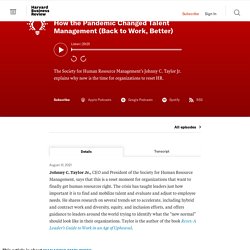
I’m Alison Beard. Over the past few months, we’ve been looking at all the ways that work has changed due to the global pandemic and what more could or should change going forward. It’s a series we’re calling “Back to Work, Better.” Now, leaders are balancing short-term crisis response with mid and long-term business decisions, while individuals are reconsidering what they want out of their careers. Digital Learning Hybrid Future. 9 Best Practices for Upskilling the Workforce. The pandemic, combined with the global skills shortage, has pushed upskilling toward the top of HR’s concerns.
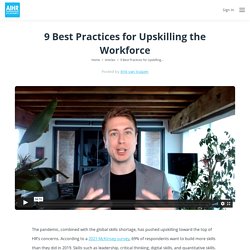
According to a 2021 McKinsey survey, 69% of respondents want to build more skills than they did in 2019. Skills such as leadership, critical thinking, digital skills, and quantitative skills. McKinsey suggested nine best practices for upskilling the workforce and then tracked organizations that applied them. SÉRIE _ Skills Next - Public Policy Forum. As the future of work continues to evolve, so too do the skills that Canadians will need to succeed.
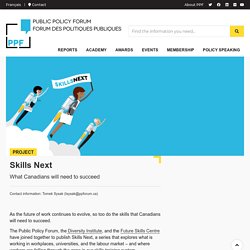
The Public Policy Forum, the Diversity Institute, and the Future Skills Centre have joined together to publish Skills Next, a series that explores what is working in workplaces, universities, and the labour market – and where workers are falling through the gaps in our skills training system. Read key takeaways in each report that will strengthen policymaking and build a strong foundation intended to help support further research by exploring the latest developments at home and around the world.
Each report focuses on one issue – such as the impact of technology in the workplace, gig work, digital skills, and barriers to employment that some marginalized groups experience – and reviews the existing state of knowledge on this topic and identifies areas in need of additional research. How Mentoring Improves the Leadership Skills of Those Doing the Mentoring. In a mentoring relationship, a more experienced person (or mentor) provides a less experienced person (or protégé) with information, support and friendship.
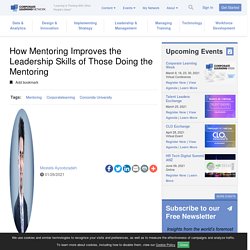
Mentoring can happen in almost any context, including workplaces and universities. We often assume that, in mentoring relationships, protégés are those who benefit the most. 5 tips on how to be a good mentor to someone twice your age. Plato and Aristotle.
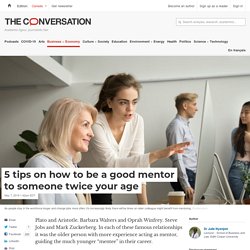
Barbara Walters and Oprah Winfrey. Steve Jobs and Mark Zuckerberg. The future skills that public servants actually need to succeed. This article is written by Helen Caldwell, Campaigns & Communications Associate at Apolitical, with contributions from Abe Greenspoon, Dr.
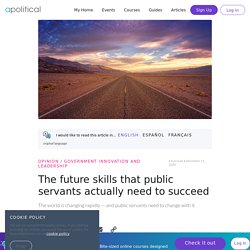
Jean Kunz, Jane Liang, Lauren Hunter, Chad Hartnell, Mark Schaan, Jacky Tweedie, and Sarah Hoy. In a rapidly changing world, it’s vital to evolve, upskill, and change with it. So we asked public servants across Canada: What are the future skills that public servants really need to succeed? Here’s what they told us. Upskilling the Workforce in the EU for the Future of Work. Artificial intelligence, robotics and other digital innovations are reshaping work with likely mixed effects.
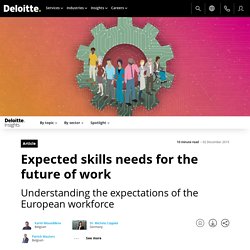
Employers and workers require the necessary digital and soft skills to take advantage of the new opportunities they are expected to face. Introduction: Skills in the future of work Emerging technology is reshaping the world of work. Automation is revolutionizing business models, tools, tasks and delivery modes.
Workers can already see the transformation happening, as artificial intelligence (AI), robotics and other digital innovations are being used increasingly in the workplace.1 The likely effects of automation are mixed. Are You Developing Skills That Won’t Be Automated? Getting practical about the future of work. What story will people tell about your organization over the next ten years?
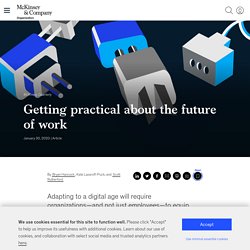
Will they celebrate an enthusiastic innovator that thrived by adapting workforce skills and ways of working to the demands of the new economy? Or will they blame poor financial or operational results, unhappy employees, and community disruption on a short-sighted or delayed talent strategy? Our modeling shows that by 2030, up to 30 to 40 percent of all workers in developed countries may need to move into new occupations or at least upgrade their skill sets significantly. Research further suggests that skilled workers in short supply will become even scarcer. Some major organizations are already out front on this issue. Employer Perspectives on Workforce Development. The nature of work is rapidly changing due to emerging technologies and disruptive forces, such as AI, the gig economy, and more.
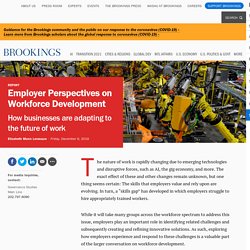
The exact effect of these and other changes remain unknown, but one thing seems certain: The skills that employers value and rely upon are evolving. In turn, a “skills gap” has developed in which employers struggle to hire appropriately trained workers. While it will take many groups across the workforce spectrum to address this issue, employers play an important role in identifying related challenges and subsequently creating and refining innovative solutions.
As such, exploring how employers experience and respond to these challenges is a valuable part of the larger conversation on workforce development. McKinsey Talks Talent: The new science of talent, from roles to returns. Welcome to McKinsey Talks Talent, a new podcast featuring McKinsey leaders and talent experts Bryan Hancock and Bill Schaninger.
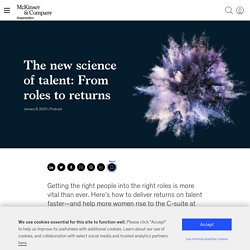
In this debut episode, Bryan and Bill speak with McKinsey Publishing’s Lucia Rahilly about why, in a world in flux, talent matters more than ever, and how to match the right people with the roles likeliest to deliver value. This is an edited version of their conversation. For more from Bryan and Bill in the future, subscribe to the McKinsey Talks Talent podcast on Apple Podcasts, Google Podcasts, or the audio player of your choice. Skills for jobs brochure 2018. Getting Skills Right: Good Practice in Adapting to Changing Skill Needs: A Perspective on France, Italy, Spain, South Africa and the United Kingdom. Workforce Readiness: The Learning Metric that Leads to Real ROI. If it wasn’t obvious before, the COVID-19 pandemic has reinforced the importance of organizational agility. Indeed, the ability to anticipate, adapt, and act on change is no longer a nice-to-have. And as the Institute of Corporate Productivity’s (i4cp) research has consistently revealed, an essential component of agility is establishing and fostering a culture of continuous learning.
This need for ongoing learning will continue to accelerate. Consider these two findings revealed in the latest World Economic Forum Future of Jobs Report (published in October 2020). The report asserts that by the year 2025: Les compétences dans un monde postpandémique - Forum des politiques publiques. La technologie au service de l’innovation dans l’écosystème des compétences et de l’emploi - Forum des politiques publiques.